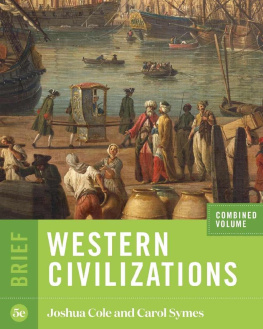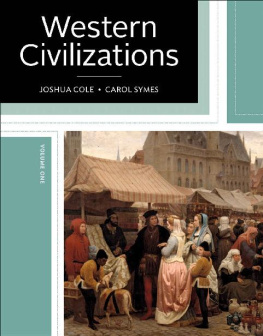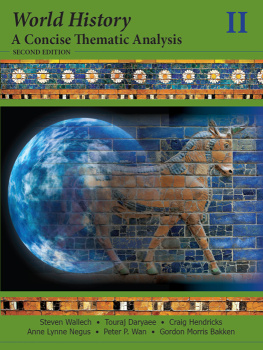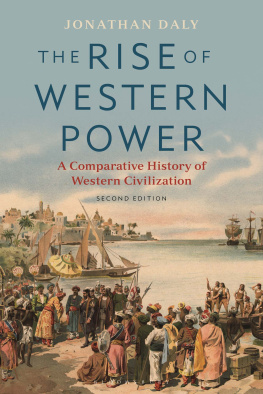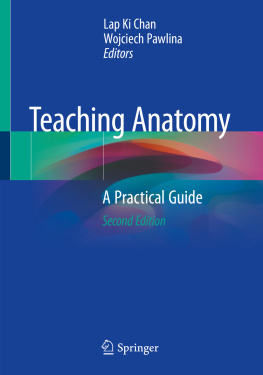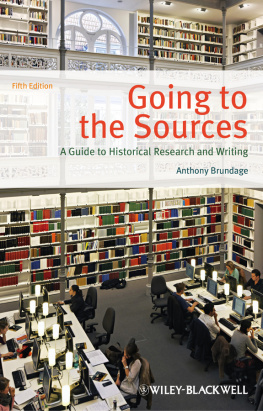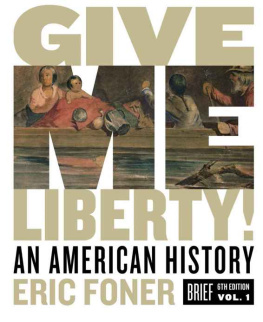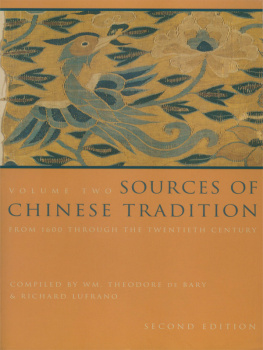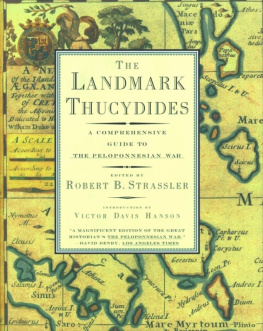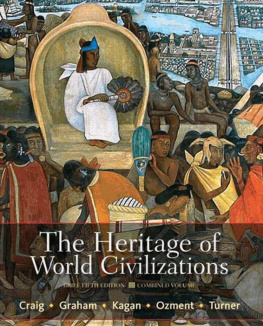Publisher's Notice
Please note that this version of the ebook does not include access to any media or print supplements that are sold packaged with the printed book.
W. W. NORTON & COMPANY has been independent since its founding in 1923, when William Warder Norton and Mary D. Herter Norton first published lectures delivered at the Peoples Institute, the adult education division of New York Citys Cooper Union. The firm soon expanded its program beyond the Institute, publishing books by celebrated academics from America and abroad. By midcentury, the two major pillars of Nortons publishing programtrade books and college textswere firmly established. In the 1950s, the Norton family transferred control of the company to its employees, and todaywith a staff of four hundred and a comparable number of trade, college, and professional titles published each yearW. W. Norton & Company stands as the largest and oldest publishing house owned wholly by its employees.
Copyright 2020, 2017, 2014, 2011, 2008, 2005, 2002, 1998, 1993, 1988, 1984, 1980, 1973, 1968, 1963, 1958, 1954, 1949, 1947, 1941 by W. W. Norton & Company, Inc.
All rights reserved
Editor: Justin Cahill
Editorial Assistants: Angie Merila, Funto Omojola
Managing Editor, College: Marian Johnson
Project Editor: Linda Feldman
Managing Editor, College Digital Media: Kim Yi
Media Project Editor: Rachel Mayer
Media Editor: Carson Russell
Associate Media Editor: Alexander Lee
Assistant Media Editor: Lexi Malakhoff
Marketing Manager, History: Sarah England Bartley
Production Manager: Ashley Horna
Design Director: Lissi Sigillo
Designer: Jen Montgomery
Photo Editor: Mike Cullen
College Permissions Specialist: Elizabeth Trammell
Cartographers: Mapping Specialists
Permission to use copyrighted material is included in the Credits section of this book.
The Library of Congress has cataloged the full edition as follows:
Names: Cole, Joshua, 1961- author. | Symes, Carol, author.
Title: Western civilizations : their history & their culture / Joshua Cole,
Carol Symes.
Description: 20th edition. | New York : W. W. Norton & Company, [2020] |
Includes index.
Identifiers: LCCN 2019030137 | ISBN 9780393418750 (cloth)
Subjects: LCSH: Civilization, WesternTextbooks. |
EuropeCivilizationTextbooks.
Classification: LCC CB245 .C56 2020 | DDC 909/.09821dc23
LC record available at https://lccn.loc.gov/2019030137
This edition: ISBN 978-0-393-68072-0
This edition: ISBN 978-0-393-41916-0 (ebook)
W. W. Norton & Company, Inc., 500 Fifth Avenue, New York, NY 10110
wwnorton.com
W. W. Norton & Company Ltd., 15 Carlisle Street, London W1D 3BS
TO OUR FAMILIES:
Kate Tremel, Lucas and Ruby Cole
Tom, Erin, and Connor Wilson
with love and gratitude for their support. And to all our students, who have also been our teachers.
About the Authors
JOSHUA COLE (PhD, University of California, Berkeley) is Professor of History at the University of Michigan, Ann Arbor. He has published work on gender and the history of population sciences, colonial violence, and the politics of memory in nineteenth- and twentieth-century France, Germany, and Algeria. His first book was
The Power of Large Numbers: Population, Politics, and Gender in Nineteenth-Century France (2000), and he recently published a second book,
Lethal Provocation: The Constantine Murders and the Politics of French Algeria (2019).
CAROL SYMES (PhD, Harvard University) is Associate Professor of History at the University of Illinois, Urbana-Champaign, where she has served as Director of Undergraduate Studies in History and has won numerous teaching awards. Her main areas of study include the history of medieval Europe, cultural history, and the history of media and communication technologies. Her first book,
A Common Stage: Theater and Public Life in Medieval Arras (Cornell University Press, 2007), won four national awards. She is the founding executive editor of
The Medieval Globe, the first academic journal to promote a global approach to medieval studies.
Preface
THIS BRIEF FIFTH EDITION of Western Civilizations is a landmark in a long and continuing journey. Since the original publication of the Full Edition in 1941, this book has been assiduously updated by succeeding generations of historians who have kept it at the forefront of the field in both scholarship and pedagogical innovation. Our newest edition carries this legacy forward, further honing the tools we have developed to empower studentsour own and yoursto engage effectively with the themes, sources, and challenges of history. It presents a clear and concise narrative of events that unfolded over many thousands of years, supplemented by a compelling selection of primary sources and striking images. At the same time, it features a unified program of pedagogical elements that guide students from understanding core content to reading and analyzing historical sources and, finally, to developing a sophisticated sense of the ways that historians reconstruct the past on the basis of those sources. This framework, and a brand-new set of activities built around select sources from each chapter, helps students to read and interpret historical evidence on their own, encouraging them to become active participants in the learning process and helping them to think historically.
The wide chronological and geographical scope of this book offers an unusual opportunity to trace historical trends across several interrelated regionswestern Asia, the Middle East, North Africa, and Europewhose cultural diversity has been constantly reinvigorated and renewed. Our increasing awareness that no regions history can be isolated from global processes and connections has merely heightened the need for a richly contextualized and broad-based history such as that represented in Western Civilizations. In this edition, we have accordingly supplemented this rich narrative with a new focus on human mobility. From the ancient world to the recent past, societies and cultures have always been shaped by people in motion. Migrationsboth voluntary and coercedare fundamental to understanding human history and have profound implications for the development of the world economy, for cultural exchange among the worlds regions, and for the history of political institutions and their development. Indeed, the study of human mobility has emerged as one of the most vital and important fields of history in recent years. Todays students are deeply interested and invested in the relationship between globalization and population movements, and in the ways that mobility is related to social conflict, environmental changes, and contemporary disagreements about national and ethnic identity. It is important that students be able to put these contemporary discussions in historical context and to see their own concerns and aspirations reflected in the historical curriculum.

